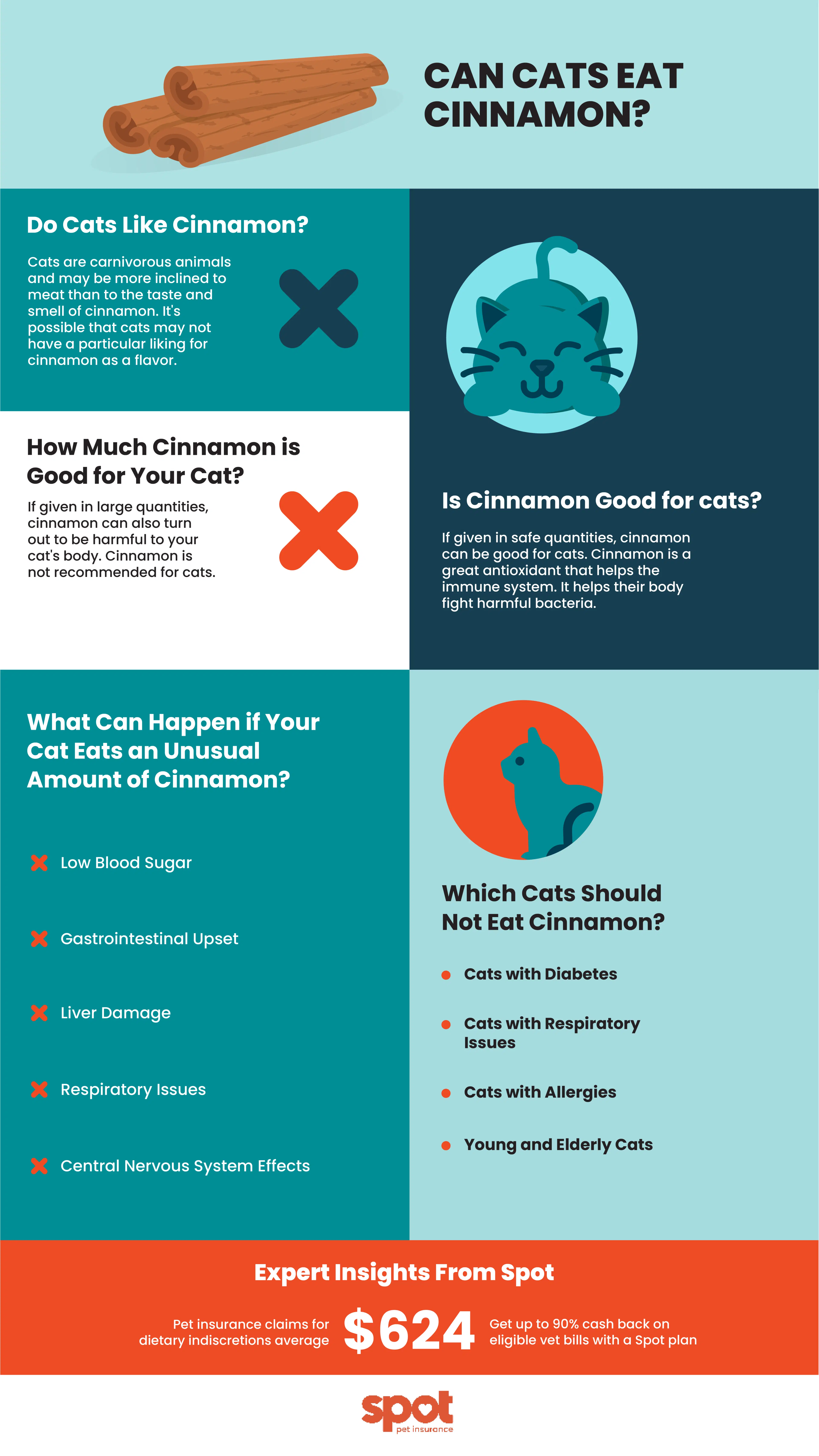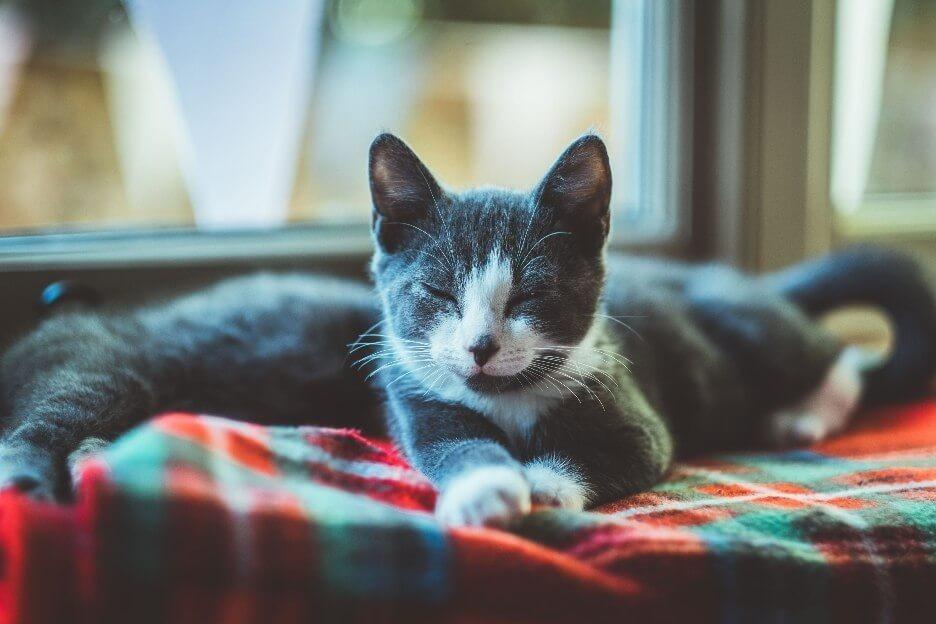The one-word answer to this question is yes, it’s generally safe for cats to consume cinnamon, although it is not recommended. In the case of cinnamon, it's best to be cautious and avoid feeding it to cats without consulting a veterinarian. Just because it’s safe doesn’t mean we should give them cinnamon. Continue reading to learn more.
Cinnamon is a herb that is generally safe for human consumption. The same cannot be said for cats, as large quantities of cinnamon consumption can negatively affect their health.1

Do Cats Like Cinnamon?
Now that we know that cinnamon is not considered toxic, let’s talk about if cats actually like cinnamon. It's important to remember that cats may have different preferences since they are carnivorous animals and may be more inclined to meat than to the taste and smell of cinnamon. It's possible that cats may not have a particular liking for cinnamon as a flavor.
Is Cinnamon Good for Cats?
If given in small quantities, cinnamon is unlikely to do any harm to your cat. However, they shouldn't ingest any amount of it as regular ingestion could be dangerous.2
Health Benefits of Cinnamon for Cats
While we may be all aware of the health benefits of cinnamon for humans, there is very little evidence that cinnamon may be beneficial to cats.
How Much Cinnamon is Good for Your Cat?
Cinnamon treats may be exciting to you but these felines may be indifferent to the taste and smell of cinnamon. If given in large quantities, cinnamon can also turn out to be harmful to your cat's body. Cinnamon is not recommended for cats.
What Can Happen if Your Cat Eats an Unusual Amount of Cinnamon?
If your cat eats an unusual amount of cinnamon, there is a possibility of a few health concerns as their bodies might react to it. It's better to know the potential risks connected with the consumption of cinnamon, as it is not well-tolerated by cats. Here are some potential side effects:1
Low Blood Sugar or Hypoglycemia: Ingesting a large amount of cinnamon can lead to hypoglycemia in cats, especially if they already have an underlying health condition like diabetes.
Gastrointestinal Upset: Consumption of cinnamon can cause gastrointestinal upset. This could cause vomiting, diarrhea, and abdominal discomfort.
Liver Damage: The compounds present in cinnamon can cause stress on the liver, potentially leading to liver damage.
Respiratory Issues: Overconsumption of cinnamon can lead to coughing, wheezing, and difficulty breathing. Cinnamon has compounds that can irritate a cat's respiratory system.
Central Nervous System Effects: In severe cases, ingestion of a large amount of cinnamon can have an adverse effect on the cat’s central nervous system, which can lead to neurological symptoms such as disorientation, tremors, and seizures.
Expert Insights From Spot
While sharing our favorite foods with our pets can be tempting, it's important to remember that not all human foods are safe for cats to eat. Spot's internal data shows that pet insurance claims for dietary indiscretions average $642*, highlighting the importance of caution and research before sharing snacks with your pet.
Which Cats Should Not Eat Cinnamon?
Some cats may have higher risk associated with cinnamon consumption than others. These cats can include:
Cats with Diabetes – Even though cinnamon may have compounds that help regulate blood sugar levels in humans, cats lack the same digestive enzyme and overconsumption of cinnamon can lead to a build up in the blood stream.2
Cats with respiratory issues– Inhaling cinnamon in large quantities can lead to respiratory irritation, so cats with respiratory conditions should stay away from cinnamon.
Cats with allergies– Some cats may be allergic to herbs and spices and they should not be consuming cinnamon as the reaction can range from mild to severe.
Young and elderly cats– Young and elderly cats may have delicate stomachs, so it's better to not introduce them to any new spices.
Conclusion
Cat Insurance helps to provide pet parents with additional financial support and peace of mind when it comes to the health and wellness of their pets. With a Spot plan, pet parents can receive up to 90% cash back on eligible vet bills. This way pet parents can focus on caring for and supporting their pets. Spot also offers preventive care add-ons, which can help cover the eligible costs of spaying and neutering, dental cleaning, vaccinations, and other routine care services. Get a quote today!

I've had the privilege of immersing myself in the realm of pet safety. As the owner of an energetic mini golden doodle, I know just how stressful being a pet owner can be. I am dedicated to ensuring our beloved pets enjoy a life brimming with good health.
*Jan 2019 to Aug 2024 administrator claims data.
Villasenor, Yvonne. “Is Cinnamon Bad for Cats? A Veterinarian Shares What You Need to Know.” Daily Paws, 12 Aug. 2024, www.dailypaws.com/cats-kittens/cat-nutrition/what-can-cats-eat/cinnamon-bad-for-cats.
Woodnutt, Joanna. “Can Cats Have Cinnamon?” Cats.com, Cats.com, 12 Apr. 2023, cats.com/can-cats-have-cinnamon.
The information presented in this article is for educational and informational purposes only and does not constitute or substitute for the advice of your veterinarian.












